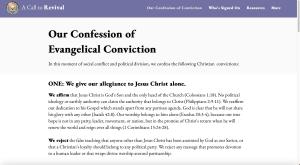Yet another group of evangelical “leaders” (whoever anointed them as such, we know not), has decided to release a document that claims to be a non-partisan statement of Christian theological conviction. The goal of this “Confession of Conviction” appears to be to unite Christians around some generic theological commitments that, if affirmed, would offset any political commitments the authors and signatories claim border on political idolatry. If, or so it seems, Christians can affirm with one voice the truth of the seven statements found in the document, then this should act to either resolve our political differences, whatever they may be, or, at least, find an agreeable way to disagree given these foundational theological commitments we hold in common.
However, I am skeptical about not only the claims in the document, but also the underlying purpose of it. My contention is that this is not really a theological statement, but instead functions as a political tactic; one veiled in biblical language, but that acts as a means to attack or undermine political opponents while appearing religiously pious and “above the fray.” To borrow a phrase from friend and colleague, Logan Zeppieri, this is political warfare dressed up in “Christian garb.”
Reason #1: The Unusually Opportune Timing
The first tip-off is the timing of the document’s issue. How convenient that a statement said to be aimed at pre-social and pre-political religious commitments is released at such a politically sensitive time, namely, in the throes of a federal election cycle. Where was this statement two years ago, when Joe Biden was in the middle of his presidency and it was unclear who might contest him for his second term?
There have been plenty of opportunities, given the ongoing social and political division we have experienced over the last 8 years, to produce a document like this. Why wait until a few months prior to the general election to take this brave theological stand? The answer is obvious: because a statement at this time, and not in a political down cycle, can have a greater effect on the minds, and emotions, of voters. It can use religious language–appealing to our deeper sensibilities– at a moment when we are particularly sensitive to the necessity of making an imminent political decision.
To have released this statement six or eight months into the Biden/Harris presidency would have been to release something at a politically inconsequential time. But to wait for the right moment tells us something about the authors and signatories. After all, this just is the mindset of the politically-motivated Christian, not the Christian who is genuinely, and generally, theological in their thinking. For Christians who care about truth, all times are equally opportune for making claims, planting flags, and digging in. For those who care about power, times are calculated and calibrated to political cycles so as to have maximum effect.
Was there anything in this statement that could not have been authored, agreed to, and released in, say, May of 2022? Are any of these claims more or less true now than they would have been then? Answer: no. But when things are done is, in many cases, relevant to their meaning and their purpose. Minimally the timing of this statement should raise some red flags, as it exposes something of the thought process and intent of its formers.
Reason #2: Vague, Very Vague, Language
With regard to the content of the statement, the most egregious problem is the vagueness of its claims. For a thorough treatment of each of the vague points made in the statement, one can watch here. But, let’s look at three of the points more closely.
First, as to point #1, these “leaders” say:
We affirm that Jesus Christ is God’s Son and the only head of the Church (Colossians 1:18). No political ideology or earthly authority can claim the authority that belongs to Christ (Philippians 2:9-11). We reaffirm our dedication to his Gospel which stands apart from any partisan agenda. God is clear that he will not share his glory with any other (Isaiah 42:8). Our worship belongs to him alone (Exodus 20:3-4), because our true hope is not in any party, leader, movement, or nation, but in the promise of Christ’s return when he will renew the world and reign over all things (1 Corinthians 15:24-28).
We reject the false teaching that anyone other than Jesus Christ has been anointed by God as our Savior, or that a Christian’s loyalty should belong to any political party. We reject any message that promotes devotion to a human leader or that wraps divine worship around partisanship.
https://www.evangelicalconfession2024.com/
Now, let’s think carefully about loyalty, or allegiance, for a moment; more carefully than these “leaders” seemed to have thought about it. As to allegiance, or loyalty, do we have no allegiances or loyalties other than Christ? For example, are you married? Do you have children? Do you work for a company or business or teach at a school? Do you have friends? Do you have any allegiance to your country?
The simplistic nature of point #1 sets up a false choice, since it makes allegiance to Jesus a political one, i.e., either you have allegiance to Jesus OR you have allegiance to your country, or, in this case, your political party. But this is an obvious false dichotomy, and it is clearly one that the authors and signatories themselves do not believe. I know some of the signatories, and I doubt they really believe that either you have loyalty to Jesus or your family, and that no reconciliation of allegiances is possible.
We all understand that our supreme allegiance is to Christ , so that other allegiances, if they conflict or contradict that one, are subservient to it and may need to be abandoned (Lk 14:26). On the other hand, if they comport with our allegiance to Christ, then they are what we might simply call “blessings.” Loyalties that honor God mirror the friendship that exists not only between Christ and His Church (Jn 15:15) but the intertrinitarian love of Father, Son and Spirit. And yes, loyalty can extend to something abstract, like the Gospel message itself.
But the way the statement is formulated is deceptive. It is trying to get people to feel that if they have any loyalty for a certain party, probably Republican in this case, that that demonstration of loyalty, necessarily, means one has abandoned Christ as Lord. But this is just wrong, and, perhaps, even manipulative. I can only imagine what kind of response I would have gotten in Afghanistan in 2012, if I had told my company commander before infilling into our district that “I was only loyal to Jesus Christ” and, as such, could have no other loyalties at all.
Now, to point #2:
We affirm that God’s saving power revealed in Jesus is motived by his love for the world and not anger (John 3:16). Because God has lavished his love upon us, we can love others (1 John 4:19). We acknowledge that this world is full of injustice and pain, but we are not afraid because Jesus Christ has promised to never abandon us (John 16:33). Unlike the false security promised by political idolatry and its messengers, the perfect love of God drives away all fear (1 John 4:18). Therefore, we do not employ fear, anger, or terror as we engage in our mission, but instead we follow the more excellent way of Jesus which is love (1 Corinthians 12:31-13:13).
We reject the stoking of fears and the use of threats as an illegitimate form of godly motivation, and we repudiate the use of violence to achieve political goals as incongruent with the way of Christ
https://www.evangelicalconfession2024.com/
Again, for a more thorough, point-by-point analysis and judgement of such pious tripe, see here. In short, however, we have to be more critical than this. Does fear always mean fear for oneself, or one’s group? Or, can one also fear for the other, the whole, the society at large, i.e., for the commonwealth.
The assumption by these “leaders” is that being fearful is unfaithful, petty, or, worse, only about the retaining of personal privilege or power. But this is a false assumption, one which betrays the authors having already drunk the kool-aid of wokeism. This “hermeneutic of suspicion” is not only unjust, but unbecoming of those who claim to be Christians and, as such, oriented toward truth. Moreover, what if one is justly fearful? What if one is fearful, for example, about the pain unborn babies will feel when their skulls are crushed by abortion doctors? What if one is fearful for the mothers who have been lied to by the culture that doing this will “liberate them?”
Are these “leading with fear” and not love? It’s hard to say.
Thus, being fearful can actually be an expression of love: fearing for the welfare of one’s children, for one’s neighbors, for the stranger, is a very human expression of love. Also, on this point, we find that only authors living in a very privileged, rich, comfortable culture would formulate a point in this way. It is easy to write or say things like “we shouldn’t lead in fear,” when you are living in a WEIRD culture. But try to say this to the Nigerian Christian fleeing Boko Haram.
Finally, fear is a clear and prevalent tool in the hands of the biblical prophet and even Jesus himself, who while encouraging his own to not be fearful, nevertheless uses the fear of eternal punishment and God’s wrath to motivate repentance:
At that very time there were some present who told him about the Galileans whose blood Pilate had mingled with their sacrifices. 2 He asked them, “Do you think that because these Galileans suffered in this way they were worse sinners than all other Galileans? 3 No, I tell you; but unless you repent, you will all perish as they did. 4 Or those eighteen who were killed when the tower of Siloam fell on them—do you think that they were worse offenders than all the others living in Jerusalem? 5 No, I tell you; but unless you repent, you will all perish just as they did.”
Luke 13:1-5
Is Jesus “leading with fear” here? Or is He just telling the truth, like pro-lifers are, or biblical marriage advocates?

Finally, let’s look at the most egregious point of all, point #6. Here, our self-anointed “leaders” had a clear opportunity to stand up and genuinely demonstrate their love for the marginalized, but, instead of taking a theological stance, they choose to be politically expedient (who are the idolators again?):
We affirm that all people bear God’s image and possess inherent and infinite worth (Genesis 1:27). Jesus bestowed dignity upon those his culture devalued, and he taught us that our love, like God’s, must extend even to our enemies (Matthew 5:43-48). Our faith in Christ, therefore, compels us to act with love and mercy toward all from the very beginning of life to the very end, and honor everyone as an image-bearer of God regardless of age, ability, identity, political beliefs, or affiliations (John 13:34-35). We commit ourselves to advocate for the value of everyone our society harms or ignores.
We reject any messages that employ dehumanizing rhetoric, that attempt to restrict who is worthy of God’s love, or that impose limitations on the command to “love your neighbor” that Christ himself removed.
https://www.evangelicalconfession2024.com/
Apparently these illustrious “leaders” do affirm one thing correctly, namely, that all human beings bear the image of God and, as such, possess inherent worth (the “infinite” part is theologically contestable, especially if one holds to annihilationism as an eschatological view). However, there is a glaring lack of conviction, or clarity, in this statement that is supposed to both convict and be clear. The vagueness about when life begins cannot be by accident. The fact that the formulators and signatories do not define when life begins, shows how politically expedient this document is. Or, better said, how this document functions as a political statement and not a theological one. This is virtue-signaling without courage, a show of piety without actual righteousness.
Ultimately, this point gives away the political leanings of the formulators and signatories. We sense where their loyalty lies as they refuse to be clear about where they stand on the most contentious moral issue of our times (with Transgenderism a close second). One can only imagine how a document like this would have read in the ante-bellum South (my parody of point #6):
We affirm that all people bear God’s image and possess inherent and infinite worth (Genesis 1:27). Jesus bestowed dignity upon those his culture devalued, and he taught us that our love, like God’s, must extend even to our enemies and slaves (Matthew 5:43-48). Our faith in Christ, therefore, compels us to act with love and mercy toward all those under the yoke of slavery or those who are free, and honor everyone as an image-bearer of God regardless of age, ability, identity, political beliefs, affiliations or slave status (John 13:34-35). We commit ourselves to advocate for the value of everyone our society harms or ignores be they slaves or free.
We reject any messages that employ dehumanizing rhetoric, that attempt to restrict who is worthy of God’s love, or that impose limitations on the command to “love your neighbor” that Christ himself removed.
See any problems here? Like perhaps the utter lack of addressing whether slavery itself is right or wrong, good or evil, or whether it is necessary to end slavery in order to properly value those the culture has devalued? Apparently for these Evangelical “leaders” one can be against “dehumanizing rhetoric” (clump of cells, perhaps?) and against “harm” toward those devalued in culture, but they cannot say whether or not murdering those who the culture devalues is wrong or not, because they conveniently leave out anything about the sufficient conditions for the image of God to be present. This is analogous to the ante-bellum slave master who may also have said, and many did, that one should extend the love of God to his slaves, but conveniently fails to mention the one, salient condition that matters for that to happen, namely, setting them free!
Conclusion: Political Idolators Projecting Their Idolatry
Projecting one’s intentions on to an opponent is not a new thing. It is common in the world of psychology, and in sociology. Leftists have been using it as a political tactic for generations: accusing your enemy of what you yourself are inclined to believe, of what you yourself are interested or obsessed with, of what you yourself intend to do. In his classic treatment of propaganda, Jaques Ellul made this insight:
Propaganda by its very nature is an enterprise for perverting the significance of events and of insinuating false intentions. There are two salient aspects of this fact. First of all, the propagandist must insist on the purity of their own intentions and, at the same time, hurl accusations at his enemy. But the accusation is never made haphazardly or groundlessly.
The propagandist will not accuse the enemy of just any misdeed; he will accuse him of the very intention that he himself has and of trying to commit the very crime that he himself is about to commit….The accusation aimed at the other’s intention clearly reveals the intention of the accuser. But the public cannot see this because the revelation is interwoven with facts.
Jaques Ellul, Propaganda: The Formation of Men’s Attitudes [emphasis added]
In writing this statement of conviction, those who formulated it and those who signed it have laid their cards bear. They, in their own eyes, are the pious, unidolatrous, pure believers who stand above the political fray and judge over those they, not-so-subtly, insinuate are in danger of “political idolatry.” Yet, they protest too much, and, in so doing, show themselves to be the genuinely political actors.














